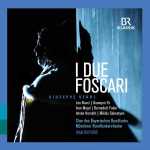
Composer: Giuseppe Verdi
Performer: Chor des Bayerischen Rundfunks
Orchestra: Münchner Rundfunkorchester
Conductor: Ivan Repušić
Audio CD
Number of Discs: 1
Format: FLAC (tracks)
Label: BR-Klassik
Size: 0.98 GB
Recovery: +3%
Scan: yes
01. Prelude
Prologue
02. Urli, rapine
03. Eroi, levatevi
04. Di vergini straniere
05. Allor che i forti corrono
06. Bella e quell ira, o vergine
07. Uldino, a me dinanzi
08. Ma se fraterno vincolo
09. Vanitosi!
10. Qual notte!
11. Quai voci!
12. Ella in poter del barbaro!
13. Cessato alfine il turbine
Act I
14. Liberamente or piangi
15. Qual suon di passi!
16. Sì, quello io son
17. Va! Racconta al sacrilego infame
18. Uldino! Uldin!
19. Mentre gonfiarsi l anima
20. Oltre quel limite
21. Parla! Imponi!
22. No! Non e sogno
Act II
23. Tregua e cogl unni
24. Dagl immortali vertici
25. Che vien?… Salute ad Ezio
26. E gettata la mia sorte
27. Del ciel l immensa volta
28. Ezio, ben vieni!
29. Ah!…Lo spirto de monti
30. Si riaccendan le quercie
31. Oh, miei prodi!
Act III
32. Qui del convengo e il loco
33. Che piu s indugia
34. Te sol quest anima
35. Non involarti, seguimi
Liudmyla Monastyrska, soprano (Odabella)
Stefano La Colla, tenor (Foresto)
Stefan Sbonnik, tenor (Uldino)
George Petean, baritone (Ezlo)
Ildebrando D’Arcangelo, bass-baritone (Attila)
Gabriel Rollinson, bass (Leone)
Münchner Rundfunkorchester
Ivan Repušić, conductor
Chor des Bayerischen Rundfunks
Following Giuseppe Verdi’s “”Luisa Miller””, with which Ivan Repuic made his debut as principal conductor of the Münchner Rundfunkorchester in September 2017, and “”I due Foscari”” in October 2018, the conductors successful cycle of early masterpieces by the famous Italian opera composer now continues with Attila. In the recording of the concert performance from the Prinzregententheater, outstanding performers provide authentic fluidity and vocal splendor. This highlight of Munich musical life from the end of last year is now already being released on BR-KLASSIK as a double album. Like its predecessors “”Nabucco”” and “”I Lombardi””, Verdi’s early masterpiece “”Attila”” is a choral opera in the best sense, and gained an enthusiastic reception from the Italian unification movement: its themes reflected the aspirations of the Risorgimento in the restless Italy of that time. The line “”Avrai tu l’universo, resti l’Italia a me”” (“”You may have the universe, but let Italy remain mine””) was enthusiastically received right from the start, helping to pave the way for the opera on the stages of Italy and Europe. It was not only the audience at the premiere at the Teatro La Fenice in Habsburg-ruled Venice who understood the full import of those words. Hardly any other opera by Verdi was received in Italy with so much euphoria. Outside the country, of course, it failed to make a lasting impression probably also due to the extremely difficult role of Odabella.



